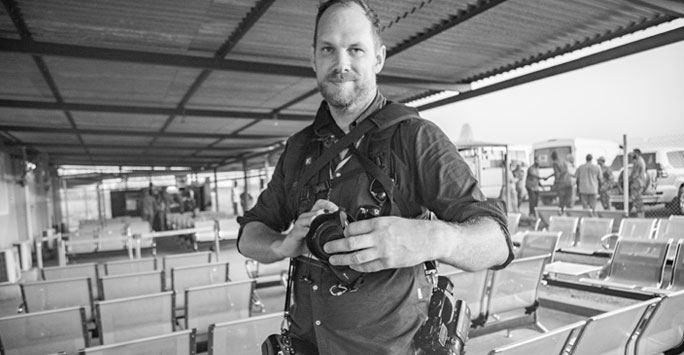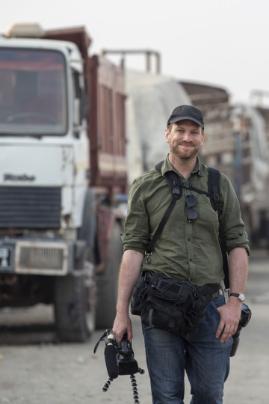
Dr Richard Stupart is a Lecturer in the Communication and Media Department. In this 'researcher in focus', Richard talks about his work on media, war and ethics, and the role that emotions can play in journalism, amongst many other fascinating things.
Listen to Dr Richard Stupart talk about his work in more detail in our Researcher in Focus podcast below.
I am broadly interested in the questions that arise when media, war and ethics collide. Included in that are things like asking what the value of stories of violence and atrocity are, what obligations we have to share (or not share) testimonies of injustice and suffering, and the challenges faced by people who try to do the work of telling audiences about things they have an obligation to know.
I completed my PhD at the London School of Economics in 2020, with a thesis that won the Firoz Lalji prize and looked at the work of journalists reporting conflict in South Sudan, the value of their work and what makes contemporary war and crisis reporting so difficult. After a year at the Center for Media at Risk at the University of Pennsylvania, I was an assistant professor of journalism studies at the University of Groningen, before coming to settle here in the department of communication and media at Liverpool.
My current work is spread over a number of different issues, but two of the areas I'm most actively thinking about at the moment tend to do with witnessing and the role emotion plays in the work of journalists.
Witnessing
 In my work on witnessing, I'm interested in the idea that 'we' (society, or groups at various scales) depend on the testimony of others to let us know both what the world is like and when there are things happening that ought to demand our attention. Climate change would be an obvious example of where we rely on the testimony of others to tell us about something manifestly important, but there are all kinds of others, ranging from war and conflict to the circumstances under which our coffee, clothes and mobile phones are made.
In my work on witnessing, I'm interested in the idea that 'we' (society, or groups at various scales) depend on the testimony of others to let us know both what the world is like and when there are things happening that ought to demand our attention. Climate change would be an obvious example of where we rely on the testimony of others to tell us about something manifestly important, but there are all kinds of others, ranging from war and conflict to the circumstances under which our coffee, clothes and mobile phones are made.
Journalists have for a long time been the most obvious profession to do this work, but it's interesting to me how it is becoming increasingly displaced by looser networks of normal folk who will step into being a testimonial role for a moment in time, because they happen to be in the right place at the right time, or because they may have some idiosyncratic expertise that allows them to perceive something the rest of us might miss.
The case of groups like Bellingcat who lean on networks of citizens to expose injustice is perhaps the most organised example, but this question of social epistemology - how groups know things - is increasingly important as our online lives increasingly provoke questions of who to trust, when, about what, and whether we might have obligations to listen to others about matters we'd rather not be told about.
Emotion and conflict journalism
From my work on conflict and crisis reporting, I am really interested in the role that emotions (excitement, fear and anger, for example) play in their work. I've written on both how anger in journalism shouldn't be understood as irrational and about how things like exhaustion and hunger are practically managed by journalists reporting miles from home under hard conditions.
Here, my work is part of a broader shift in journalism studies known as the emotional turn, where I and others are interested in how emotion might be a core part of the professional and ethical lives of journalists, rather than just some sort of background condition. For conflict and disaster reporting, it's a particularly overdue perspective, as this is a kind of work that would be irrational without taking emotion into account. It generally pays badly, is extraordinarily precarious and often carries very real risks. Without being able to use the language of emotion to explain it in terms of things like guilt, excitement or righteousness, it would be difficult to really get to grips with why people continue to risk their safety to do it.
Contact Richard via his University staff page.